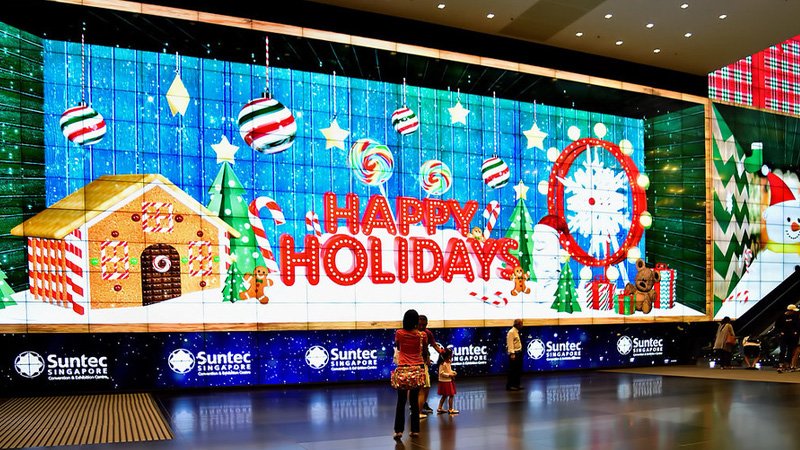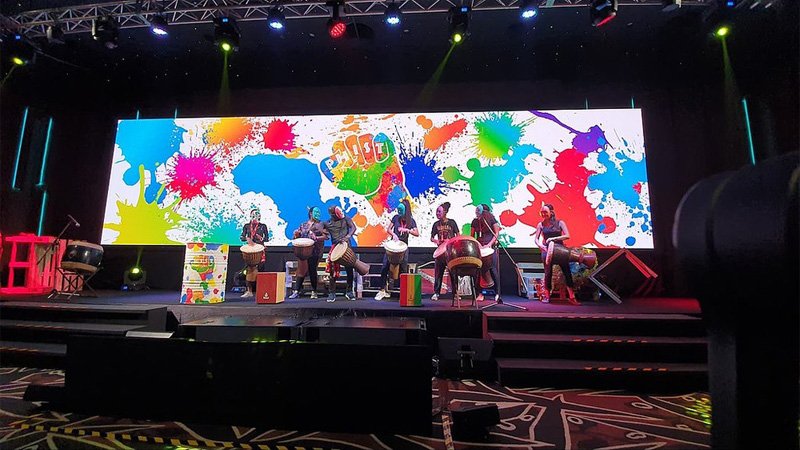Meetings, seminars, lectures, corporate events, and many indoor and outdoor activities require display technology to be more informative, interactive, and immersive. Projectors screens and LED walls are among the most common display technologies used during those events.
We will discuss projector screens and LED walls and see which is the better option for you and most people.
1. Projector Screens and LED Walls
Projector screens are generally any surface on which a projector can be used to show images or videos. They can be walls or any white surface that can display content. However, in this context, we refer to projector screens as portable, mobile, installed surfaces, usually made of white material.
In the early days, projector screens were mainly used for entertainment purposes, like showing films. Since they are portable, films can reach far-flung places, and people can enjoy what cinema has to offer.
With the increasing diversification of ways of life, projector screens find other uses and applications. Today, most seminars in universities, small corporate meetings, and events technically employ various projector screens.
Those who are into sales management and selling products also employ projector screens. The portability of projector display systems allows its users to conduct informative lectures, bringing the equipment wherever they need it.
An LED wall is relatively new compared to the projection screen. Its emergence is due to the advanced technology associated with LED, which revolutionized display technology. Since its inception in 1962, LED has found a wide range of applicability in different industries, from electricity and engineering to entertainment and advertisement.
Nowadays, many associate LED technology with various display technologies, of which LED walls are among the most important. An LED wall consists of panels or screens assembled and tiled together, creating an extensive, single-display system resembling a television.
Compared to other display technologies, projector screens and LED walls are of a different mold, talking about the technology behind it, the materials, use, purpose, and cost. But what are the pros and cons of using one over the other?

2. Comparative Advantage: Projector Screen vs LED Wall
Using a projector screen or an LED wall has distinct but apparent advantages. There are drawbacks as well.
Projector Screen
A projector screen is usually of definite size, and even if you use white walls instead of a portable or installed surface, its size is limited. However, there are significant advantages for those who use projector screens.
- Advantages
● It is easy to install; in fact, a typical projector display system will probably take less than thirty minutes to install. Everything, though, will still depend on the size and location. But assembling a projector display system is almost no different from installing a game console on your television.
● It is portable. You can typically bring a projector screen and all the equipment anywhere. You can immediately use it once you find a suitable location to put it.
● It is commonly of higher resolution. That is due to the advanced technology employed by most projectors. You can easily find projectors that project UHD resolution to projector screens.
● Projector screen systems are less expensive than their LED wall counterparts. The price differences are so enormous that they have become the determining factor in the ultimate choice between a projection screen and an LED wall.
There may be significant advantages, but projection screens also have distinct disadvantages.
- Disadvantages
● Projector screens are less bright than LED walls. In fact, you must factor in lighting to optimize the use of projector screens. Outdoors, it is best to use projector screens at night, while indoors, you need to adjust the lights to optimize the use of the display technology.
● The space between the projector and the projector screen needs to be unobstructed. As such, though portable and mobile, you need to optimize space use to optimize the use of projection screens.
LED Wall
LED Walls have a significant edge over projection screens in some aspects. The advantages due to the inherent technology associated with LED’s. LED walls also have practical advantages over projector screens.
- Advantages
● A projector screen has a definite size, but not so with LED walls. Since they contain many tiled and arranged monitors, you can customize them according to your liking. It offers limitless potential in displaying content because you can add monitors to achieve the desired size or aspect ratio.
● You can use an LED Wall anytime, in fact, you can run it almost the whole time, whether it is day or night. Though the light outdoors may affect any display technology, an LED wall may exhibit the same efficiency regardless of whether it is day or night.
● It is the same if you operate it indoors. An LED wall need not be unobstructed. You can put it anywhere inside to optimize it for viewing—there is no need for any unobstructed space.
● LED walls have better lighting, whether the earlier ones with backlights or the newer ones. They are brighter than projector screens. Since you can add monitors, you can optimize them for viewing regardless of crowd size or the size of the venue. They will have the same clarity and resolution.
There are some disadvantages, however, when using an LED wall.
- Disadvantages
● LED walls are much more expensive than projector screens. In fact, it is not uncommon for others to rent an LED wall rather than buy one due to the very expensive display technology.
● An entire LED wall system may cost more than a hundred thousand dollars, a conservative estimate.
● Though it can be more extensive and thus will be of great clarity, the resolution is lower than that of projector screens. An Ultra High-Definition LED wall is rare, and if ever, costs very expensively.
● Most LED walls offer a resolution of 1080P, which is ideal for most circumstances, but they are still lower than what projector screens offer.

3. What to Choose?
Projector screens and LED walls can deliver high-resolution, quality content to viewers. They are best for displaying content for a large audience, whether indoors or outdoors. They are ideal for large gatherings and big events, especially when located in a large space with many people.
But why should you choose one over the other?
Projector Screen
You should choose a projector screen if:
- You are always on the go
If you use display technology as you move from place to place, then having a projector screen is not only ideal but a must. They are portable and easy to install. Unobstructed space is a small thing compared with the benefits of easily displaying content.
- Higher Resolution
Projectors can operate in Ultra-High Definition on projector screens. If you need to show something with great clarity and higher resolution, you can choose a projector screen.
- Better for Indoor Use
You can optimize projector screens indoors, especially during the daytime. However, you can only optimize this display technology outdoors if you operate it at night when it does not need to compete with the sun’s light.
Light has always been a disadvantage of projector screens, but indoors, you can adjust the light to suit the projector screen’s needs. You can also optimize space and location to neutralize disadvantages due to the lack of lighting.
- Very Economical
Even the most expensive projector screen system costs less than many LED walls. If you are on a tight leash, the choice is an obvious one.
LED Wall
On the other hand, you should choose LED wall because:
- Best for Customization
Unlike the projector screen, which has a definite, fixed size, you can arrange and tile the LED screens according to your preference. You can increase or decrease the size according to the nature of use and events, the number of people, and the estimated number of viewers and audience.
An LED wall also has added features for customizing display content. You can do a split screen and show multiple display contents on a single large display. The video processors and controllers included in the LED wall also allow for greater customization concerning aesthetics such as colors, allowing for a more immersive experience.
- More Lighting
Your display content might need better lighting, which LED walls provide. They can also neutralize the effects of sunlight, other lights, and darkness, minimizing their negative impact on displaying the content.
- Best for Live Performances
Major events and live performances employ LED walls; in fact, LED walls might be the only display technology ideally suited for these events. It is not only because others cannot be customized to be large display screens but also because LED walls are the only medium that can give viewers the most incredible aesthetic effects.
Considering this, LED walls are enormous. You can adjust their colors, enhance their features, and optimize them for a more immersive experience. You can install them outdoors, day or night, without impacting the display content.
The feel and overall aesthetic effect it can give, by its sheer presence in an event, is different. It gives a different vibe to the event; no wonder it is the display technology of choice for concerts and the like. No wonder, too, that others are willing to spend that much for LED walls.
- You Want a Good Investment
Getting an LED wall presupposes that you are into a business where you can capitalize on it. If you are, there is no reason why you cannot use it for your affairs and business and benefit from it, or you can rent it to others for profit.
LED video walls command a high price, but you can get everything you want, including a return on investment and even greater profit, from having one. A central live event in your locality will almost certainly employ an LED wall, and you can capitalize on it by renting it to those who need it.

4. The Verdict
Your needs, use, and practicality will ultimately decide whether you choose a projector screen or an LED wall. However, both are efficient for indoor and outdoor events and promotions and can cater to a large audience.
Projector screens are best for indoor events, where you can control light and spacing, optimizing them for a better viewing experience. They are for those who want a portable but affordable one. They are easy to install and have a fixed size that will fit in a closed space.
LED walls may be preferable for outdoor events, especially big ones, where customization might play a key role in giving a more immersive experience. However, because LED walls are expensive, those who want them must have long-term plans to use them to benefit from their use for a long time.
But whatever display technology you need or have in mind, LEDSINO is always here to help you. We will explain the issues and other intricate details you need to know about display technologies. That will help you decide what display technology best suits your or your business needs.
5. Final Thoughts
Projector screens and LED walls are favorites in significant indoor and outdoor events. They can cater to a large audience, and their sizes and resolutions can give an immersive experience and excellent viewing experience despite the distance.
They have their advantages and drawbacks. In choosing one, you must factor in your needs, the use, practicality, the location, and the size of the crowd so you can optimize the display technology. You must also consider the nature of your activities and business and your long-term strategizing and planning to choose the right display technology for you.



